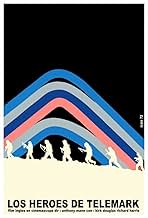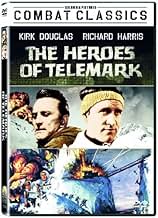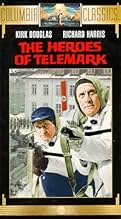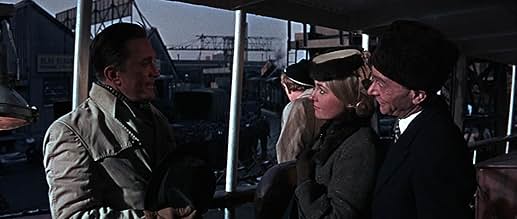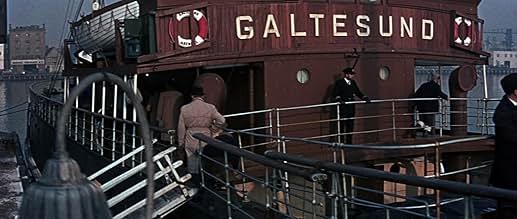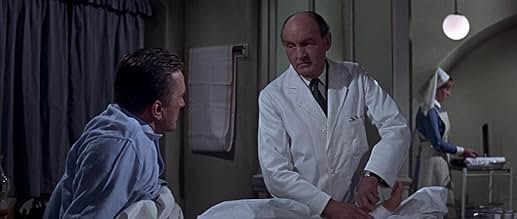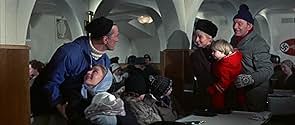Norwegian resistance tries to stop German efforts to produce heavy water needed for making atomic bombs during World War II.Norwegian resistance tries to stop German efforts to produce heavy water needed for making atomic bombs during World War II.Norwegian resistance tries to stop German efforts to produce heavy water needed for making atomic bombs during World War II.
Featured reviews
Directed by Anthony Mann (his last film) with a mostly British cast, and starring KIRK DOUGLAS and RICHARD HARRIS, it's based on a little known true-life episode. Their mission: to return to Telemark from England and see whether ground invasion is possible--rather than bombing, because the village nearby is heavily populated. As someone else observed, Kirk and Richard spend more time fighting each other than the Nazis. Whatever animosity lies beneath the surface of these two stars, it shows on the screen.
Douglas reluctantly joins a group of nine men who go on the ground mission after a bombing raid wipes out some of the resistance fighters. Director Mann gets every bit of suspense out of the perilous mission...and the aftermath when the men are hunted by the Gestapo and wanted dead or alive.
Some of the derring-do has been fictionalized, I'm sure. Douglas manages a narrow escape on skis even though he's been wounded with a gunshot to his ankle. Several other aspects of the story have the ring of dramatic license.
It's tense and taut with remarkably good performances from KIRK DOUGLAS and RICHARD HARRIS especially. Well worth seeing and enjoying as a World War II adventure yarn based on a true incident.
The story is previously told in the Norwegian film "Kampen om tungtvannet" from 1948. As such, you may call this a remake. The reason for remaking the film is of course the language. As always a good film does not get better by making it one more time. The Norwegian film is in my opinion far better because it is more realistic. The problem of Heroes of Telemark is that even if it is telling a true story, it seems artificial. The Norwegian film is more exciting and believable. Even the acting in the Norwegian film is better than in the remake, even though the actual `heroes' themselves play some of the parts!
Knowing that those who resisted in Norway did it from real anti-fascist conviction and the fact that they wanted to do something against their unwelcome occupiers.
The Heroes of Telemark and the Norwegian film, Kampen om Tungtvannet on the same subject that was previously done showed the Norwegians in their resistance just such a chance even though it did not help one bit in the liberation of their country.
The Nazis have a plant used for making heavy water, deuterium, water made with a hydrogen atom with a neutron as well as a proton. This stuff was critical in the development of the atomic bomb. When a Norwegian scientist got wind of it he gets a message to a colleague played by Kirk Douglas who escapes to Great Britain to inform the Allied High Command.
Douglas goes back to Norway and with Richard Harris makes several attempts to destroy the water. A whole lot of people, British Commandoes and Norwegian citizens die in the attempts made. But the job gets done.
Hey if the job hadn't gotten done, I'd be writing a review of a different kind of film, maybe in German.
Kirk Douglas and Richard Harris prove uneasy allies. In a recent biography of Harris it was reported that he and Harris did not get along at all on this film. Douglas is a talented egotist and Harris was quite the carouser back in those days and also didn't get along with both Marlon Brando and Charlton Heston on films he co-starred with them. Not a good combination for a happy set, but the film got done.
Anthony Mann did some great location photography in Norway for this film, shot on the actual sites. Kirk and Dick on skis, even if it was stunt doubles were something to watch.
The Heroes of Telemark is a good World War II action/adventure film and a nice tribute to the Norwegian resistance.
Together with the three mentioned above, one of the most popular films is 'The Heroes of Telemark', directed by the brilliant Anthony Mann, a great director of western and ensemble films, who lived in Europe back then and worked in Samuel Bronston's blockbusters. Using his savor-fare in 'The Heroes of Telemark' he adapted a true story that took place during Germany's invasion of Norway. He worked together with screenwriters Ivan Moffat, Knut Haukelid and Ben Barzman (with the support of novelist John Drummond) and the magnetism of Kirk Douglas, Richard Harris, Ulla Jacobsson and Sir Michael Redgrave. We must not forget the excellent photography of Robert Krasker, which transports us to Telemark (Norway) in the comfort of our seats, and also the elegant score by Malcolm Arnold (who also composed the music for 'The Bridge on the River Kwai'). Curiously enough, Kirk Douglas worked with Anthony Mann again when he started to direct 'Spartacus' (1960), before he was replaced by Stanley Kubrick.
The film is set in the region of Telemark (Norway) in 1942, when the allies found a document that irrefutably proved that German scientists were making progress in the search for atomic fission at the Vemork heavy water plant, situated next to the small town of Rjukan, and were in the middle of making an atomic bomb that would change the course of the war. 'Heavy water' is a chemical compound with a molecular formula equivalent to water, in which hydrogen atoms are replaced with deuterium, a heavy hydrogen isotope.
Back then, Norway had built up its own resistance, made up of civilians and former soldiers. One of the members, Knut Haukelid (1911-1994), twin brother of actress Sigrid Gurie, became a national hero after being part of the real commando that appears in the film. The Norwegian resistance and the British army work against the clock to prevent Hitler from achieving his long-awaited bomb: Together they draw up an ambitious plan to destroy the Vemork factory. Once they rule out the possibility of bombarding, Operation Freshman is launched – British paratroopers are deployed over Telemark and are supposed to join the resistance, led by the Norwegian soldier Knut Straud (Richard Harris), who does not hesitate to seek the help of physicist Rolf Pedersen (Kirk Douglas). To make it all even more dramatic, Pedersen discovers that his ex-wife (Ulla Jacobsson) and uncle (Sir Michael Redgrave) have joined the resistance. This is dangerous for him personally because one's feelings can often cloud one's reasoning in times of war. The human reactions that take place in the film help to establish a stronger connection between the audience and the protagonists.
Operation Freshman proves to be unsuccessful because the Horsa Glidier gliders crash and part of the crew die in the accident, and the rest are shot by the enemy. A great part of the true story emerges in the film, although the name of Major Knut Haukelid is changed to Knut Straud (Richard Harris), in order to allow certain liberties in the development of the film. After the first mission fails, the Norwegian commando that is waiting, made up of 15 volunteers (in the film there are only 9), launches Operation Gunnerside. They enter the factory and destroy the tanks where the 'heavy water' is stored. The facility remains inactive for two months but the Germans manage to rebuild the tanks and increase production. The saboteurs ski all the way to Sweden to avoid being captured by the Germans, while the Norwegian and British soldiers continue to rack their brains to find a way to stop the production of 'heavy water'. These events pick up speed in the film and shortly after the first attempt to sabotage the factory, Kirk Douglas and Richard Harris (after a thrilling persecution on skis) come into action again and plan to blow up the factory which is about to transport the 'heavy water', even if they have to risk their lives and those of their loved ones to complete the mission.
For just over two hours, and thanks to the rhythm and elegance that Anthony Mann stamps in every shot, the audience will travel alongside the protagonists, in their adventures and mishaps, and will discover a truly interesting series of historical events. The filming locations were Vemork, Rjukan, Tinnsjo and Gausta, in the region of Telemark, in Norway, and also Oslo, because Anthony Mann wanted to make the most of the beautiful landscape. While he was there, he shot magnificent skiing scenes, in the manner of the best German Bergfilms. We must not forget that the region of Telemark is the cradle of skiing, as it is known today.
Not that it's not a common occurrence, and I'm not defending such practice - but I do feel it necessary to point out that THIS film is NOT, in fact, a Hollywood film at all. It IS a British film. Any complaints one can have with the omission or alteration of events must be directed at Rank, not at the non-specific "Hollywood".
The events of the movie, and the true-life events, are fascinating. It's a terrible thing to contemplate, Nazis creating the atomic bomb. What would our world be like today if they had succeeded? This was certainly a WWII story worth telling.
Did you know
- TriviaIn early 1940, the Allies approved a naval campaign designed to seize the northern part of Norway, a neutral country, including the key port of Narvik, and possibly also to seize the iron mines at Gällivare in northern Sweden, from which Germany obtained much of its iron ore. The British planned to invade Norway in March 1940 to use the ports as bases for the Royal Navy in order to encircle Germany, but the operation (codenamed Plan R 4) was postponed. The British and French had previously planned to invade Sweden, in order to assist Finland during the Winter War against the Soviet Union. Adolf Hitler found out about Plan R 4, and militarily intervened as the British began Operation Wilfred by laying mines in neutral Norwegian waters.
- GoofsEarly in the movie Dr Pedersen enters a boat in Oslo harbor to go to Trondheim. Nobody would take a boat from Oslo to Trondheim (a long trip lasting several days) as there is a direct train lasting 8-10 hours. In any case there was never a regular boat service from Oslo to Trondheim. Later Pedersen says he is going to Kristiansund, a town south of Trondheim.
- Quotes
Terboven: Winston Churchill is puffing an extra big cigar today. And we laugh at him. Why? Because all these containers, which the British did so much to destroy, have already been pre-fabricated in Berlin. They are already on their way here and will be installed by tomorrow.
Nilssen: That is... I must say that is fantastic efficiency!
Terboven: Don't you ever make the mistake of under-rating the Germans. By Easter we will have not merely 10,000 pounds of heavy water, but 12,000 pounds of heavy water.
- Crazy creditsOpening credits prologue: GERMAN-OCCUPIED NORWAY 1942
- ConnectionsEdited into Krigens beste historie - Kampen om tungtvannet (2015)
Details
- Release date
- Country of origin
- Official sites
- Languages
- Also known as
- Los héroes de Telemark
- Filming locations
- Production company
- See more company credits at IMDbPro
Box office
- Budget
- $5,600,000 (estimated)
- Runtime2 hours 11 minutes
- Aspect ratio
- 2.35 : 1
Contribute to this page



